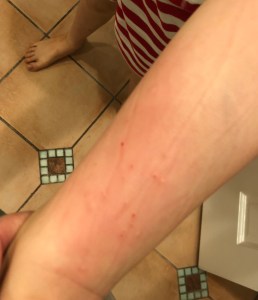Beginning this spring, we let Martin ride his bicycle, alone, to the park a mile from our house. Martin recently turned 11. We started allowing this when he was 10. The journey to the park involves four streets: up our hill, right turn, another right turn and half mile down, left turn onto the park’s road. The park has tennis courts, fields, multiple playgrounds, a skateboard/bicycle course, and a large community pool (which Martin cannot enter without an adult and entry fee). He takes a bottle of seltzer water, in a holder on his bicycle.
Martin must wear his GizmoWatch when he goes, he must answer when we call, and he must call us if he leaves the park for any reason. The GizmoWatch is connected to an app on my iPhone (and on Adrian’s, and on my brother Eddie’s) and has a tracking device; I can set the app to notify me if Martin leaves a given area, such as the park and surrounding neighborhood. So long as the watch is turned on and is with Martin, I can also use the app to pinpoint his location.
Martin’s primary motive in riding to the park seems to be to see other kids. He’s an only child, and he doesn’t get m(any) play date-invitations. Once my brother spied on Martin at the park: Martin was riding his bike around and greeting other kids if he saw them. Twice Martin has returned home almost immediately and announced that there were no kids at the park. Other days he’s stayed at the park for up to three hours. When I call to check on him, those hours-at-the-park afternoons, I hear him talking to other kids, or I hear kids in the background. Sometimes Martin tells me what he’s doing—“I’m just here talking to friends,” or, “I’m riding in the skate park”—and other times he says only, “I’m busy.”
If he leaves the park to ride around the neighborhood or to accompany a friend home (he’s not allowed to go inside unless I know the family and give permission), he is conscientious about calling, maybe conscientious to a fault. He phones me block-by-block: “Hi, Mommy, I’m riding on A Street now.” “Hi, Mommy, now I’m on B Street.” “Mommy! I’m in the middle of C Street.” I don’t mind answering my phone every two minutes. Better that than not hearing from him.
Adrian says that if Martin were typically developing, he would not allow him to spend hours at the park unsupervised. But for the reasons I mentioned above—only child, lack of play dates—plus wanting to support Martin’s burgeoning desire to be independent and interest in other kids, Adrian says the benefit in Martin’s case outweighs any detriment from stranger-danger. We are blessed to life in a safe community, and the park is generally populated with neighborhood adults, including some who know Martin, so I agree with Adrian. As an added benefit, being at the park means Martin is not wandering around the house asking, “What can I do?” and claiming boredom because the only thing he wantsto do is use an iPad.
I do, however, worry about what’s going on with the other kids. Are they being kind to Martin? Are they teasing him? Will someone, just to be mean, take or damage the very nice bicycle he received as a gift last year? Martin has a better sense now of unkindness and teasing, but he rarely knows how to respond when he experiences such behavior. Often he lets himself be bullied and we hear about the event only at bedtime, when he’s crying because of what another kid said or did.
I’d feel more comfortable if one of us were right next to him, all the time. That’s clearly not what he wants. So off he goes.
And while we are talking bicycles, maybe you will enjoy this seven-year flashback as much as I did: Special Guest Author: My Mother on How Martin Learned to Ride a Bike.










